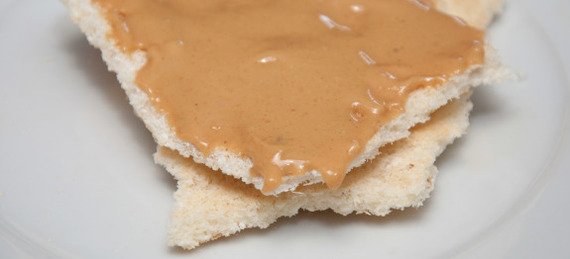While I have shed no tears over Kobe aka The Black Mamba's retirement, many others and myself are wailing over the looming endangerment of another mamba three thousand miles away from L.A.
This other precious mamba is also indigenous to the continent (remember, Africa is not a country), and comes from the center of the Caribbean. It is a most exceptional product made in and by the first Black republic, a condiment so beloved once you have had it, nothing else will compare. We make varieties of it ranging from sweet to savory and spicy. The latter is my favorite, laced with ground scotch bonnet peppers. 'Mamba' is the Kreyòl word for peanut butter.
Growing up in Haiti, one of my fondest memories is seeing mamba made. A huge fire would burn in Tante Botte's yard, upon which a gigantic black cauldron full of peanuts would roast. Afterwards, adults would stand up and use a large winnowing tray with rhythmic consistency to separate the dried skin from the peanuts. The nuts would then be dumped into a huge stainless steel grinder that would eat your fingers if you weren't careful. (Us kids did not get to touch it.)  Adults kept pouring nuts into the grinder, adding a little oil and salt. Someone else turned the lever. Finally, the giant metal mouth spewed out delicious mamba. Extra special batches were made with hot peppers. When it was all done, Botte doled it out into jars of various sizes to be sold. (We got to take some home!).
Adults kept pouring nuts into the grinder, adding a little oil and salt. Someone else turned the lever. Finally, the giant metal mouth spewed out delicious mamba. Extra special batches were made with hot peppers. When it was all done, Botte doled it out into jars of various sizes to be sold. (We got to take some home!).
To me, mamba is as quintessentially Haitian as basketball is (North) American. Now, it faces risks as another charitable gift of food aid undermines Haitian autonomy by threatening to bench local farmers' peanuts production, our cultural practices, and even our tastes. This is not our first time. Haiti has been tripped up by the U.S. before.
Wesleyan University's Professor of sociology, Alex Dupuy, the author of Haiti: from Revolutionary Slaves to Powerless Citizens, among other works, puts this game in historical perspective: "First, the U.S. destroys Haitian agriculture by compelling the then Aristide government to lower tariffs to a level lower than anywhere else in the Caribbean, and then exports its own subsidized agricultural goods (rice, cereals, chickens, etc.) to the country, as former President Clinton acknowledged with crocodile tears. Now, it is dumping its subsidized peanuts on Haiti and undermining the ability of Haitian farmers to increase peanut production. The hypocrisy never stops, and Haiti's own sycophantic government officials are all too willing to abide them in their destructive policies for the crumbs they get in return. "
Commenting on a Washington Post article about the Clinton's connection to this nutty affair, Jacques Lemieux adds more spin, referencing U.S. destruction of the Haitian Creole pig: "We are doing to the peanut farmers the same damn thing Bush Senior let the pork producers push him into in 1989!" After that, it was our rice. As Dupuy noted in 2010, Clinton apologized profusely to the Senate Foreign Relations Committee and took sole responsibility for what he called "a devil's bargain". This policy, he told journalist Kim Yves, "failed everywhere it has been tried". It flooded the Haitian market with subsidized U.S. rice and ruined Haitian rice farming. Such humanitarian efforts maintain U.S. home court advantage, and have consistently detrimental, long-term economic effects on local agricultural producers.
NGO expert, anthropologist Mark Schuller, author of Humanitarian Afterschocks in Haiti responded to this geopolitical replay: "We really thought that the U.S. would be doing away with using Haiti as a market for our products. Apparently USAID hasn't gotten the message. Like the cotton growers in the U.S. South and the HOPE Act, USDA's "peanuts envy" highlights who makes and who benefits from U.S. foreign policy." Dupuy had specific advice for our benevolent allies, "If the USDA really wants to help Haiti feeds its own people, why does it not start by pressuring the U.S. government to change its neoliberal "free trade" policies and work with Haitian farmers to boost domestic production instead?"
This administration's foreign policy vis-à-vis Haiti abounds with flagrant fouls. There is still time for the USDA to avert penalty, if President Obama, an avid hoops fan who also laments Black Mamba's departure, addresses this foul play. For the sake and love of Haiti's mamba, may the ties that bind basketball to humanitarian aid and foreign policy resonate beyond my discursive musings. Moreover, since this policy needs a serious time out, we are willing to concede a free throw to the President. So in the freestyle words of the WH's favorite cultural producer, Lin-Manuel Miranda, "He should not throw away his shot" to avoid another post-presidential apology that Haiti's people and fragile economy can actually do without.